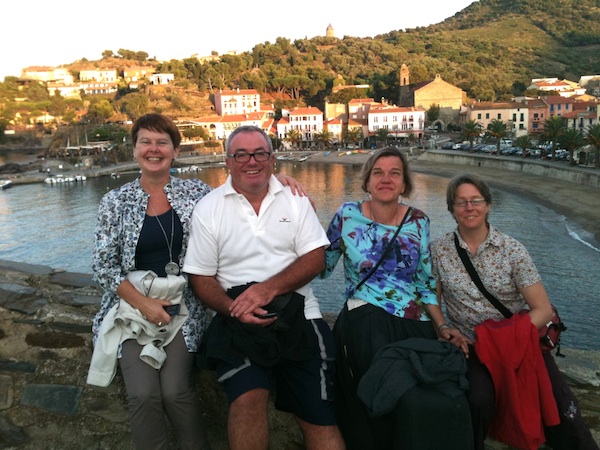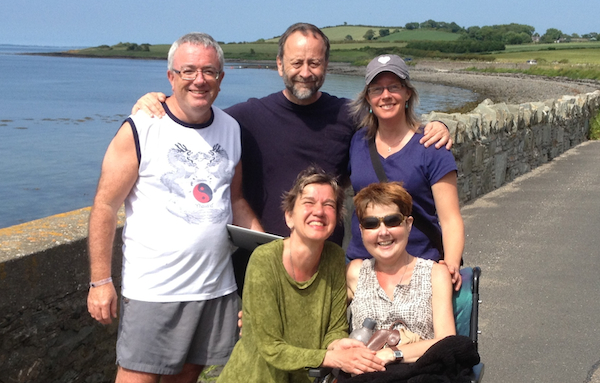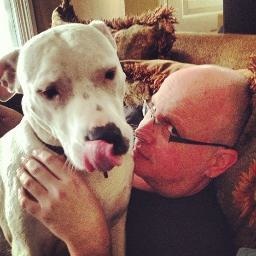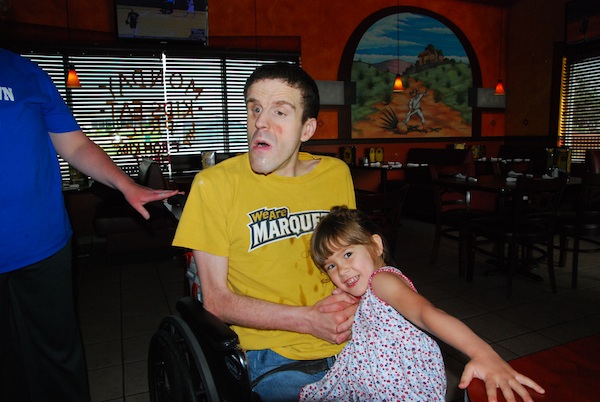
That’s wee Sheelagh on the left, our friend Jim Neill, Beth, and Beni. It was taken in August, 2011 in the picturesque Collioure, France.
It’s difficult to put thoughts about our one-of-a-kind friend Sheelagh into words, so I am very grateful to my husband Mike Knezovich for doing that for us in his guest post today.
In August of 1986, our son — name still to be determined — was getting ready to be born. About the same time, Sheelagh Livingston — an unsuspecting college student from Belfast, Northern Ireland — arrived in Urbana, Ill. Sheelagh had qualified for a year-long exchange program at the University of Illinois, and found herself in the middle of corn and soy bean fields and 90 degree heat with 90 percent humidity.
Undaunted, she asked at the university Study Abroad office about volunteer opportunities outside of campus. She wanted to learn about real Americans, she said. Beth had worked at that office in her seeing days, and one of her former colleagues suggested that Sheelagh contact Beth, who needed a volunteer reader.
On September 3, 1986, the ob-gyn doctor said it was early, but it was time, and scheduled a Caesarian section. Gus was born, he nearly died in the delivery room, and he ended up being in the neonatal intensive care unit for a month. It was crazy, and I took to leaving status updates on our answering machine for concerned family and friends. During that time, young Sheelagh called our number and was treated to a message with a crisis-filled report on Gus and Beth’s condition.
She admitted later that she wondered what she might be getting herself into. “Bloody Americans,” she said, astounded that we’d share personal details on an answering machine. But she left a message. Beth returned it, and eventually, Sheelagh was coming to our home all the time. Ostensibly, she came to read to Beth — mail, bills, and other printed stuff I couldn’t keep up with. But Beth and Sheelagh hit it off riotously from the beginning and became partners in crime. They were two jigsaw puzzle pieces that somehow, serendipitously, fit together perfectly.
I had a lot on my plate back then, so I wasn’t always tickled to learn that somehow walks with Gus in the pram or visits to coffee shops had replaced reading that day. I’d come home, there’d they be. I’d ask how the reading went, and they’d both break into laughter. Reading?
Beth — and I — had a new friend. An interesting one. A vibrant, cherubic, impish, knobby-kneed, twinkly blue-eyed, red haired force of nature who talked a blue streak in a beautiful lilt. She was just good to be with in a room. Beth had been laid pretty low by going blind and then a year later giving birth to a baby with a genetic disorder. Sheelagh was unfazed by it all. And that meant everything to Beth, and really, to me, too.
Sheelagh took road trips with us, had dinner at our place, met our families and friends. And charmed pretty much all of them. When the academic year ended, we gave Sheelagh a hearty farewell party, and she was off for the finale of her American adventure: hiking the Grand Canyon. Beth was despondent. Sheelagh was the first friend she’d made after losing her eyesight. That hadn’t occurred to me until Beth said it. And it really drove home how, for just awhile there, Beth had lost her mojo. With Sheelagh, it’d come back, but Beth thought she’d seen the last of wee Sheelagh.
I, on the other hand, had no doubts that we’d see her again. And I was right.
By 1988, our lives had settled to the point where we could take a trip, with Gus in tow, to Europe. Beth’s sister Marilee and her family were living in Germany then, and they generously agreed to care for Gus so that Beth and I could take off for Berlin to meet up with Sheelagh and our mutual friend Gerald.
A lasting memory from our arrival at the West Berlin train station: I told Beth I could see Sheelagh and Gerald walking toward us on the platform. Sheelagh’s lilt was easy to distinguish from the other accents on the platform, and when she called out a hearty “Hullo! Beth spread her arms for an embrace. At that very moment another woman rushed by to catch a train, and Beth joined the stranger in a perfect, figure-skating pair twirl. They came to a rest, both broke into laughter, and the woman ran on toward her train. Sheelagh saw it all and arrived in a stitch, as she would say.
We sort of traded off continents from then on. We visited Sheelagh in her hometown, Belfast. We met her parents, ate shepherd’s pie cooked by her mom, heard the story of how her dad had been hijacked by an IRA operative, and got a taste of Belfast life during the troubles (it was actually pretty normal, save for the troop carriers). Sheelagh visited Urbana and joined us on a driving trip to the North Carolina coast, helping with Gus. We listened to Country Music, explained–as best we could–about the South and the North. She was entertained, if not also a little stunned. (“This country is so bloody big!”)
And so it went. We traveled back to Berlin after the wall came down, and we took a holiday in Italy together. Beth visited Sheelagh on her own in Rome once, too, and then with a friend years later, after Sheelagh became an occupational therapist and resettled in a lovely lough-side town in Northern Ireland called Portaferry. Sheelagh met her loving companion Beni after she moved back to Northern Ireland, and the two of them were married in 2011. We met up with them in Warsaw, Poland, for our friend Gerald’s wedding. And when Sheelagh and Beni visited us in Chicago we spectated at the Chicago Marathon, attended a gospel choir rehearsal at a friend’s South Side church, and biked the lakefront.

We were lucky to reassemble the crew this past July in Portaferry. That’s the beautiful Strangford Lough in the background.
Through it all, whenever Beth and Sheelagh would come together, they were immediately joined in rhythmic chatter. I have no idea what all they talked about — at least partly because Sheelagh talked very fast in her accent — and I gave up trying. Eventually I knew to learn to get out of the way for at least a couple hours a day and let them pick up from wherever they had left off, whether that was yesterday or last year.
We’ve communicated by sending old-fashioned cassette tapes back and forth over the years, and a few years ago Sheelagh sent a tape with some bad news: She had cancer. She underwent vigorous chemotherapy, and by the time we met her, Beni, and our London friend Jim (who generously organized our holiday) in France, you wouldn’t have known she’d had so much as a cold. After a long, tough go of it, she was the little bouncy ball of sunny mischief she’d always been. And we had a delightful time.
Earlier this year, Sheelagh scheduled a Skype call with Beth. Beth knew immediately it couldn’t be good news. I opted for denial. Beth was right.
The cancer was back with an evil vengeance. Not much more that doctors could do. Sheelagh’s wish? She wanted to be with friends. We planned our visit to Portaferry for May, but Beth’s SOB aortic valve tumor canceled that. We arrived in Dublin on the Fourth of July instead, after Beth’s doctors said it’d be safe for her to travel. Sheelagh and Beni met us in a camper van — they’d bought it earlier this year to take trips to see the friends Sheelagh loved so much.
It was a wonderful few days. Each morning, Beth joined Sheelagh in her bedroom while I read downstairs. Our friend Jim flew in for the visit, too, and every afternoon he’d arrive from the B&B he was staying at and we’d all have an outing together — Sheelagh was still mobile, if laboriously slow. “Our house looks like an OT equipment showroom,” she joked — and she and Beni did have walkers, grab bars, and other hardware of all stripes. We had lunch with her parents, who’d come down from Belfast. We took turns pushing her in a wheelchair as we walked along the Strangford Lough. We met the locals, all of whom knew Sheelagh and Beni.
Throughout, Sheelagh was…Sheelagh. I don’t know how, but she was.
This past Wednesday we heard from Beni: After a bash for Sheelagh’s 48th birthday last week, things had gone bad to worse quickly. Sheelagh died at home, with her sister Fiona and her beloved Beni at her side.
It’s never going to make sense to me. I know that. I just hope I eventually learn to accept it. I’ll take great comfort from the gift of those four sublime, sunny days in Portaferry with Sheelagh and Beni and Jim. The combination of sparkle and spunk in Sheelagh’s face is etched, and I will always be able to recall her beautiful, sing-songy voice. And like all of her friends, I will always ache for just one more visit.
00




